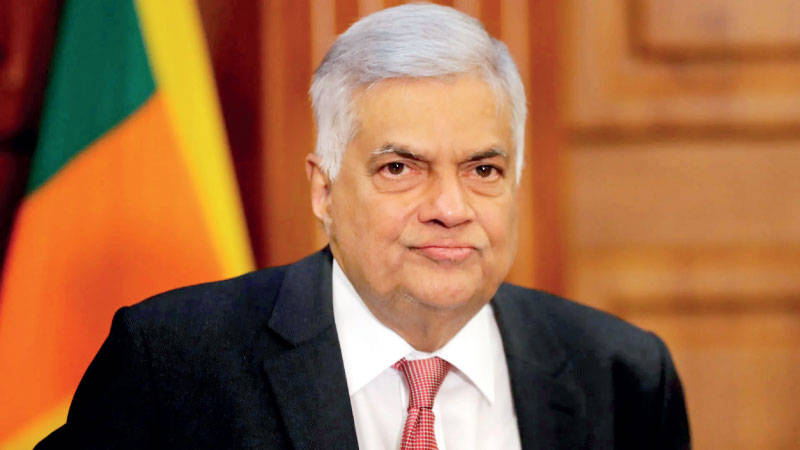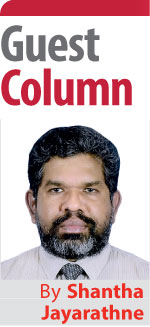Monday Feb 16, 2026
Monday Feb 16, 2026
Monday, 17 June 2024 00:20 - - {{hitsCtrl.values.hits}}

Wickremesinghe’s track record suggests a pattern of governance that prioritises personal and political survival over genuine public service
 In the complex and turbulent political landscape of Sri Lanka, Ranil Wickremesinghe has emerged as a figure of significant controversy. Despite holding the office of Prime Minister six times and now serving as President, his tenure has been marked by a series of strategic manoeuvres that have often sidelined democratic principles and prioritised political expediency over national interest.
In the complex and turbulent political landscape of Sri Lanka, Ranil Wickremesinghe has emerged as a figure of significant controversy. Despite holding the office of Prime Minister six times and now serving as President, his tenure has been marked by a series of strategic manoeuvres that have often sidelined democratic principles and prioritised political expediency over national interest.
A record of political opportunism
Wickremesinghe’s political career is a study in resilience and opportunism, akin to a chameleon that changes its colours to blend with its surroundings. The leader of the United National Party (UNP), the oldest political party in Sri Lanka, he has managed to stay relevant through numerous political storms. However, his methods and motivations raise serious concerns.
In the 2020 general elections, Wickremesinghe’s UNP faced a humiliating defeat, failing to secure even a single seat. His personal vote count from the Colombo District was a mere 30,000—the lowest ever for a Prime Ministerial candidate in Sri Lanka. Despite this clear mandate from the people, Wickremesinghe leveraged the national list to re-enter Parliament, clinging to power like a shipwrecked sailor to a lifeboat.
Undermining democratic processes
One of the most telling episodes of Wickremesinghe’s political life was his tenure as Prime Minister under President Maithripala Sirisena. In 2015, he orchestrated Sirisena’s defection from the Sri Lanka Freedom Party (SLFP) to become President, allowing Wickremesinghe to assume the role of Prime Minister. Once in office, he systematically stripped the President of many executive powers, effectively consolidating power within his own office. This move not only destabilised the Government’s functionality but also sparked a constitutional crisis when Sirisena attempted to dismiss him, leading to a protracted legal battle that ended with Wickremesinghe’s reinstatement by the courts.
The Rajapaksa alliance
Wickremesinghe’s recent rise to the presidency in the wake of Gotabaya Rajapaksa’s resignation further exemplifies his reliance on political alliances rather than popular support. His presidency was secured with the backing of the Rajapaksas, a family with a contentious legacy in Sri Lankan politics. This alliance casts doubt on his independence and commitment to democratic governance, suggesting a presidency more beholden to powerful political factions than to the electorate. It’s as if Wickremesinghe is dancing to the Rajapaksa’s tune, orchestrating his moves to their rhythm rather than the people’s will.
The Central Bank Bond Scam
One of the most notorious scandals linked to Wickremesinghe’s tenure is the Central Bank Bond Scam. Wickremesinghe appointed his friend, Arjuna Mahendran, as the Governor of the Central Bank of Sri Lanka (CBSL), despite Mahendran being a Singapore national. Under Mahendran’s oversight, the bond auction process was manipulated, leading to significant financial losses for the country.
The Presidential Commission of Inquiry implicated both Mahendran and Wickremesinghe, yet Mahendran remains at large, and accountability remains elusive. This scandal exemplifies Wickremesinghe’s tendency to place personal connections above national interest, akin to a captain who lets his friends plunder the ship’s cargo while the crew and passengers suffer.
A history of unresolved controversies
Wickremesinghe’s political career is riddled with unresolved controversies that cast a shadow over his leadership. Allegations regarding the Batalanda torture chamber, where severe human rights abuses were purportedly conducted during his tenure in the late 1980s, continue to haunt his legacy like ghosts from a dark past.
Additionally, his administration has been linked to numerous shady business deals involving close cronies and elite businessmen, raising questions about corruption and mismanagement of the country’s wealth.
His associations with selected politicians from his own party, who are accused of robbing the wealth of the nation, further undermine his credibility as a leader committed to transparency and integrity. These unresolved issues paint a picture of a leader who is more of an auctioneer, selling out public assets and compromising national interests for personal and political gain, like a merchant who sells family heirlooms at a bargain price to line his own pockets.
Selling out public assets
One of the most pressing reasons to reconsider Wickremesinghe’s leadership is his approach to managing public assets.
His tenure has seen a disturbing trend towards the privatisation of national resources and state-owned enterprises. Critics argue that these actions amount to selling out public assets, often to foreign investors, which undermines national sovereignty and jeopardises the country’s economic future.
This trend resembles a gardener selling off the topsoil of a once-fertile land, leaving behind barren ground incapable of sustaining growth.
A vision for the future
As Sri Lanka navigates through economic challenges and seeks a path towards sustainable development, it is crucial to elect leaders who prioritise the nation’s long-term interests over short-term political gains. Wickremesinghe’s track record suggests a pattern of governance that prioritises personal and political survival over genuine public service.
In conclusion, the upcoming elections present an opportunity for Sri Lankans to choose a leader who embodies transparency, accountability, and a commitment to the public good. Ranil Wickremesinghe’s history of political manoeuvring, controversial alliances, and unresolved scandals does not inspire confidence in his ability to lead the nation towards a prosperous and equitable future.
It is time for new leadership that can restore faith in democratic institutions and safeguard the interests of all Sri Lankans.
(The writer is a former Senior Consultant at the Sri Lanka Institute of Development Administration (SLIDA) and taught at the Henley Business School of the University of Reading, UK.
He can be reached through [email protected].)